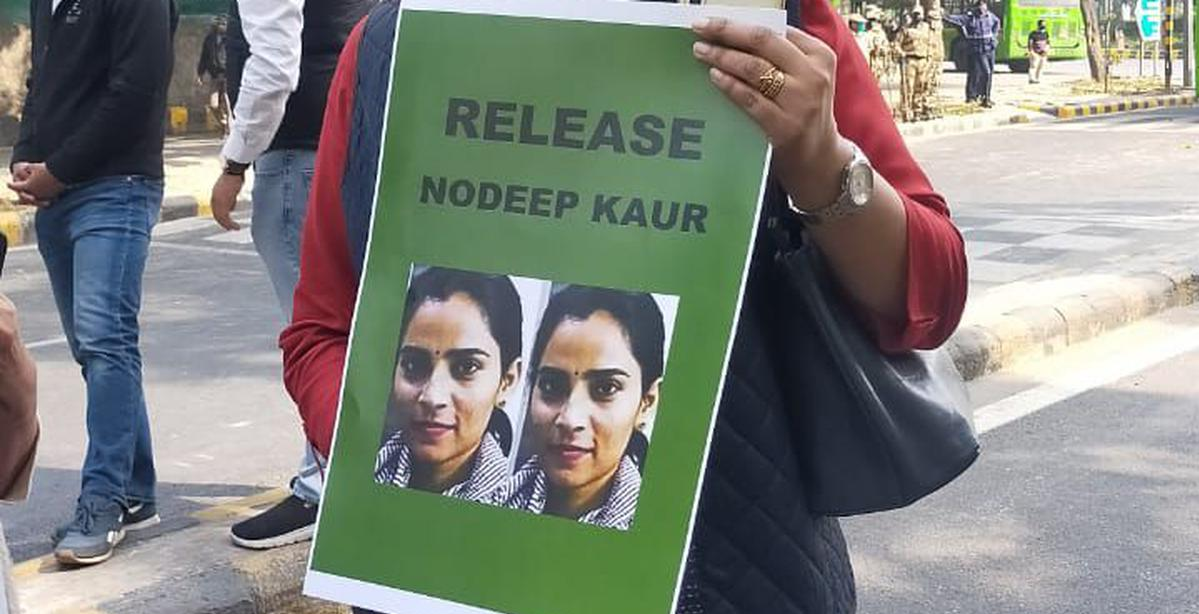by Prof. Shivaji Sarkar
Is India suppressing the voice of the masses to prepare for a future with private companies controlling the country? Or is it just working under their command? Immediate provocation was the treatment faced by Nodeep Kaur, a labour rights activist and her summary arrest. These questions are not new. A Bengali film Sagina, or its Hindi version Sagina Mahato, played by Dilip Kumar in 1970 portrayed how tea gardens repressed workers and a dissenting voice was lured, character assassinated. Similar or worse was the portrayal, in 1978, of labour situation and extortion of Dhanraj Tamang, a tea garden laborer and protester against oppression, played by Uttam Kumar being tortured by the police in connivance with the tea estate owners and sent to lunatic asylum and killed.
The newspapers of those days often were full of atrocities by the industrialists. Journalists devoted more time in covering trade union activities that dogged the workers across the country leading to many checks and solutions but not elimination of the oppression. The solace was that a multi-tiered administration everywhere had many sympathizers for the right causes. The domain was assigned by seniors to cub reporters as it was believed that they could realistically portray the human interest stories.
The newspaper offices were poured everyday with hundreds of press releases with similar stories of deprivation, extortions or summary dismissals. It’s a myth that only Left parties or trade unions aligned to them projected such atrocities. The unions of various socialist groups or even the Indian National trade Union Congress were raking up these issues with élan. Even then farmers’ agitations by sugarcane farmers or Shetkari Sangathan were vibrant.
The state mechanism first became partners in oppression. The protests were ruthlessly suppressed. Lip sympathies during elections were routine. But the government used to act cautiously so that they were not branded anti-worker. On public platforms, despite their clandestine leagues with industrialists, no leader would extol the private oppressive industrialist and always would say that the labour departments would protect the interests of the workers. It was different that each case used to take decades for a solution, in most cases in favor of the workers, though implementation was difficult.
There was another plan. Whether it was Kolkata or Kanpur, politicians encouraged industrialists to shift their units elsewhere. The capital shift ruined both the major industry centers of eastern and northern India. Interestingly, the industrialists were never told to reform as the donations even then worked behind the curtains. The planned closures of the units causing capital flights caused severe job losses and economic problems. The industry rarely implemented the labour laws in their spirit and wage recommendations were mostly diluted if not consigned to dustbins.
And there began the game plan of maligning trade unions. Their leaders were maligned by their employers as being on their rolls, as it happened to Sagina, or those who did not kowtow met the fate of Dhanraj Tamang. The workers’ unrests were projected as “conspiracies” of rivals or Trade Union forces. As the industrialists did not reform, the Trade Union were blamed for all the ills though still, till 1990s nobody batted for privatization. The rapid liberalization and privatization through dilution of stakes in public sector post-1990 has been causing havoc. The last few years saw loss of 17 lakh jobs in the PSUs alone.
Demonetization and covid19 lockdown caused rapid unemployment and losses to medium and small entrepreneurs. The rapid decline in cash flow has heaped miseries everywhere. Small farmers are gasping. Medium farmers are struggling to stay afloat. The present farmers’ agitation or sit-ins around Delhi borders at Ghaziabad, Tikri or Singhu are symbolic of collapsing social situations woven around agriculture.
In such situation, 24-year-old, Nodeep Kaur, who is a member of the Majdoor Adhikar Sangathan, says they mobilized people for a protest at Kundli in Sonipat district (Haryana) against new farm laws. Her bail pleas alleged, this support to farmers as well as demand for payment of Rs 5 lakh (a paltry amount) pending wages to some workers, ‘annoyed the administration’ and the police grabbed her by her hair and dragged her. This sparked protest and lathi-charge by the police. Later she was beaten, she says, at the police station – almost a replica of the 1970s.
Is protest wrong in a democratic polity? It is not. But it hurts the new industrialists who are keen on capturing all. They are on a quick profit game even at the cost of the nation. With feudal mindset they abhor a whiff of words that stops them on their march to grab roads and expressways, farms, their produce and the rightful price to them.
The farmers have more to fear. The entire rich agricultural span from Delhi to Meerut and Haridwar, Delhi to Agra, Delhi to Ambala, or Delhi to Rewari will not remain an agricultural area for long. It is becoming “rich” industrialist or real estate desert as fertile farmlands are being rapidly acquired for Jewar airport, thousands of kilometers of roads and over a dozen continuous “smart” cities. Farmers need to be wary of their possessions, which they are giving up willfully for a few glittering coins. Even if the farm laws are withdrawn, the loss would be severe to farmers and agriculture. The industry has planned to clear lakhs of farms from large tracts of western UP, Haryana and Rajasthan and along the dedicated freight corridors. After another five years, there would not be many farmers left in the region. Their loss would be loss to the people but victory of the mighty. There could be more Nodeep Kaurs but solution for a better life may elude the country as voices are being choked by what Prime Minister Narendra Modi says, “the babus” in police or administration. There is also a peculiar silence of the elected representatives – MPs and MLAs. India remains a farm-based economy and if it is destroyed, it needs to be imagined how the country would thrive.
(A Veteran journalist and media academician, Prof. Shivaji Sarkar is Head, Dept. of Mass Communication, Mangalayatan University, Aligarh (UP). He specializes in writing on financial matter.)


